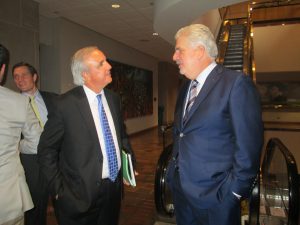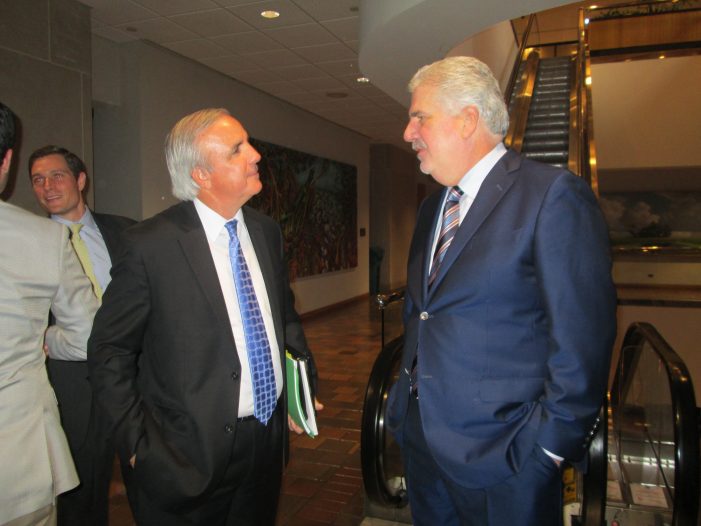There are so many things that are bothersome or just plain wrong about the Sun Life Stadium deal and the much-touted referendum vote for the public financing of apparently desperately-needed upgrades to the private home of our beloved Miami Dolphins, that this may become a Political Cortadito series.

But, for the most part, the main concerns are not about the deal, perse. I mean, Ladra is not even really sure. I’m not a deal broker. Most of us aren’t. We all want to trust our once Golden Boy Miami-Dade Mayor Carlos Gimenez to get us the best terms — but under reasonable circumstances and a normal timetable
Neither is present here. And that is the concern.
The process is in “shotgun mode,” as Miami-Dade Commissioner Esteban Bovo said Wednesday. We do not like the mounting pressure and the feeling that we are on a runaway train that hasn’t stopped since January.
Forget that it is, indeed, welfare for billionaires, just for a moment. Yes, owner Stephen Ross — worth $4.4 billion, according to Forbes — can likely afford to solo finance the $400 million in renovations to Sun Life Stadium, which he privately owns and profits from. Do we benefit from the events there? Sure. But it’s a give and take. And he benefits more. But of course he’d rather not pay the whole thing. Maybe he can buy a few more cars instead. Or build another $15-billion planned neighborhood with a Coach headquarters and Danny Meyer eateries like the one his company broke ground on in December on Manhattan’s West Side.
Forget that it is on the heels of a terrible deal on the public’s back for the Marlins stadium that has left such a bad taste in everyone’s mouth it is the orange and teal elephant in the room, no matter how much everybody else tries to separate the two publicly-financed stadium makeovers. Okay, they are different deals. Given. Who cares? Doesn’t make it right. Is that our threshold now? “It’s not as bad as the Marlins deal.” Really?
Again, Ladra found herself disturbingly agreeing with Bovo, whose questions and concerns and proposed amendment (more on that later) were refreshingly logical compared the the rest of the dialogue. “This is not the Marlins deal. The pressure has ratcheted up. ‘If we don’t do this, we don’t get a Super Bowl,'” Bovo said, citing what Ladra calls the political blackmail points in the agreement.
Watch for them to become the campaign’s scare tactics. This one about losing the Superbowl will be targetted to young and male voters. The other is going to be a mailer or robocall or something that tells us we could lose the Miami Dolphins to another city if we don’t vote yes. No, I am not kidding. That’s why the agreement has a clause that requires the Dolphins to stay in Miami for the duration of the 30-year contract. Even though this is something that had not even been remotely discussed nor really fathomable before this controversial proposal became a priority. Because, while Commissioner Juan Zapata thinks the ballot language was written by a pollster — which is entirely possible, given that FIU Professor Dario Moreno, a national pollster who collected and analyzed the most recent opinion data on the stadium plan is a friend of the mayor’s — the ballot and the agreement also reads like someone gave them some media advice.
The messages are clear. And they easily translate into scare tactics that will be, mark Ladra’s growl, part of the campaign to convince you, dear voter, that this deal must be done. Or you “won’t get a Superbowl.” And you “could lose” the team.
And that, ladies and gentlemen of the jury, is why, for the first time in my life, I do not support a public referendum. I don’t trust the process. It just seems somewhat manipulated through sneaky verbiage, pressured time restraints and a well-financed campaign that will, I suspect, include the allegedly “impartial” information that Chairwoman Rebeca Sosa promised she would get to the people in English, Spanish and Kreole (more on that later).
Let’s look at the ballot language, for example. Zapata was not the only one who took issue with it. Bovo wanted to amend it so that the words “increase in bed tax” replaced “additional taxes” on the ballot. He said it was in the interest of transparency.
“I noticed that the words increase of tourist bed tax is not in there. I want it to be crystal clear with voters that there will be an increase in the bed tax,” Bovo said.

What a no-brainer, right? Wrong. Commissioner Barbara Jordan — who sponsored the resolution and apparently does not want that to be as clear — disagreed. “Additional means additional,” she said. Como? She called it an “unfriendly” amendment, which I must admit sounds contrary to democracy. By the very nature of it being an amendment it is not going to be exactly what you wanted. Is this still not a democracy? And it gives her the right, as sponsor, to shut him down. Really?
Again, I side with Bovo. Additional taxes could be interpreted as taxes taken from an existing pool while it would be much more cristalino that an “increase in the bed tax” is an increase in an existing tax. We never use the words “tax addition” during budget time, do we? No. We use “tax increase.” The language, and Jordan’s argument, is negligent at best and disingenuous at worst. And, of course, since it was not a public hearing, nobody could raise a concern. Other than Bovo. And Jordan shot him down, with Sosa’s help. But she can pass the buck (again) to Jordan.
Let’s take the timing next.
Again, I sided with Bovo, who really shone in this meeting — making Ladra almost hope, for a moment, that he doesn’t get arrested for any role in the absentee ballot fraud centered around his Hialeah district office last year. The commissioner questioned the speed with which this was being railroaded. My word, not his. He asked if there had ever been an election turned around in such a short time. The answer from our Miami-Dade Elections Supervisor Penelope Townsend was no, there has not. The recall election, which seemed like lightning speed, was in 45 days. And, Bovo noted, it was voter-driven, not initiated by Big Sports.
“If there’s a special election that we call, not the residents, there should be a minimum of 60 days,” he said.
But that could be part of the manipulation. Short election cycles are better for scare tactic strategies about complicated issues where the proponent has, basically, unlimited amounts of cash to fund a public opinion campaign. Remember the historic recall in 2011?
 So are small turnouts. (Ditto). Why do you think May 14 is so attractive? Yes, I understand that they need it to strong arm the NFL into giving them a future Super Bowl. But you can’t tell Ladra that Ross and Dolphins CEO Mike Dee and everyone else involved — even Gimenez, I dare say, whose friends and campaign contributors are close to the Dolphin organization — didn’t see this coming, oh, a year or two ago? Maybe last January? So maybe it could have been on the ballot last year? In the primary, even?
So are small turnouts. (Ditto). Why do you think May 14 is so attractive? Yes, I understand that they need it to strong arm the NFL into giving them a future Super Bowl. But you can’t tell Ladra that Ross and Dolphins CEO Mike Dee and everyone else involved — even Gimenez, I dare say, whose friends and campaign contributors are close to the Dolphin organization — didn’t see this coming, oh, a year or two ago? Maybe last January? So maybe it could have been on the ballot last year? In the primary, even?
The right political strategist may have told them, based on the numbers, to hold on and do it in a special election. Smaller groups are easier to turn your way. And the opposition, which usually mounts way after the offense, only has a little time to take the spin out and put things in context.
Sosa — who reminded everyone she was first elected in 2001 in a 45-day cycle to replace former Commissioner Pedro Reboredo, who resigned after a corruption scandal into his payments to ghost employees — told Ladra a day after the meeting that I should not be so jaded.
“Trust the people, Elaine. The people are not bobos,” she said. “The people know what is part of a campaign and what is not. The people, lately, are very involved in what is happening and I love that.
“Maybe you call me naive. But I feel that the last time we came to this table, if we had a public vote, we wouldn’t have many of the issues we have now. I remember,” Sosa said, because the Marlins stadium stink is really all over this.
“The biggest concern with the people then was that they were not allowed to make the decision themselves,” Sosa said. “If you tell me the county has to spend money on a special election, I would have concern. But since we don’t, it creates a territory where you can give the opportunity to tell the people, ‘We’ve been here before. but you’re going to make the decision, this time.”
I trust the people, Chairwoman. It’s the process I’m wary of.

